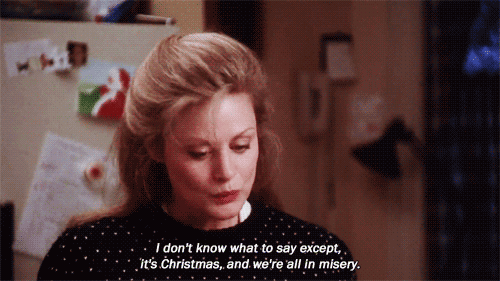Three Tips for Navigating the Emotional Roller Coaster of the Holidays
As a grad student throughout my 20s, neither me, my partner at the time, nor our friend group could afford to travel home for Thanksgiving. Right on the cusp of finals, and barely stretching our minuscule stipends to make rent, we opted instead for something rather simple, yet nonetheless magical: Friendsgiving.
Friendsgiving was a clear departure from the high-intensity family holidays most of us were missing. It involved as late or early a start to cooking and gathering as was needed, a loose and flexible list of guests, low expectations for ambience in our tiny rentals, and eclectic potluck-style contributions of favorite, regional dishes from friends from around the country and the world. And let’s be honest, due to our child-free lives, Friendsgiving could be as indulgent, silly and long as we wanted, with everyone chipping in to clean up, wash dishes, pack up leftovers, and redistribute the unopened bottles of wine at the end.
Looking back, it wasn’t just the shorter to-do lists or the fun of being with friends that made those days so special. It was that sweet combination of low-pressure, strictly voluntary tasks and an ultimate sense of frivolity–that the stakes of the day were low, expectations were minimal, and the potential for fun high. In some ways, Friendsgiving recreated the Thanksgiving of our childhood - where we were responsible for little and instructed to have fun with siblings, friends and extended family. Oh, and to eat - a lot.
Since those sweet days of Friendsgiving, life has come at all of us, fast. We’ve gone through break ups and lost dear parents. Some of us have had our own children, with various needs and struggles. We’ve made cross-country moves and faced the devastation of family estrangement, as we’ve reckoned with abuse or been rejected for our gender and sexual identities. Whatever our particular story, the uniting truth is that the holidays aren’t as simple as they used to be.
This truth has launched a thousand think pieces about the stress of the holidays, especially for moms and other caregivers who carry the load of creating joy for themselves and for others. My WLE colleague Leah Ruppannner has written about why the mental load feels so damn heavy. It isn’t just a long to-do list of things necessary to keep our loved ones happy and healthy that constantly ruminates in our heads. It’s also that those to-do lists are absolutely laden with high emotional stakes. And when do those tasks feel more emotional or higher stakes than the holiday season, when memories of holidays past, the hope and anticipation of what could be, and the inevitable reminders of the worst ones we’ve ever experienced lurk around every corner?
I’ve been working on generating solutions to these common problems for overwhelmed working parents over the last few years, as a researcher on the Better Life Lab Experiments project. And what I’ve found is that while shortening holiday to-do lists and managing the expectations of those around us can be liberating from overly tight schedules and increase our propensity for joy, the emotional nature of the season continues to pull us back to fraught and frantic holiday mindsets.
A favorite holiday movie in my family is National Lampoon’s Christmas Vacation. And who better captures the spirit of unmet expectations and high-stakes emotional investment than Chevy Chase’s Clark Griswold and his loving family? So, if you’re feeling the pressure of the holiday blues this year, here are some resources and tips for managing the suffocating weight of the holiday mental load:
1 - Say it with me: “It’s Christmas, and we’re all in misery.”
While the movie is more a lesson in what not to do than what to do, Ellen Griswold was onto something when she admitted to her own Christmas misery. Research from the Mayo Clinic suggests that acknowledging the pain of the holiday season can go a long way to helping you cope with it.
Sometimes, it’s the perceived pressure to act happy and deny our saddest feelings in the months of November and December that makes it so hard to grapple with our full range of emotions. Be honest with yourself and those around you. And who knows? Maybe your honesty will create an opportunity for others to share and to strengthen your relationships above and beyond the social opportunities of holiday parties.
2 - Tradition should be meaningful, not an obligation freezing you in time with your most fraught emotional memories.
It’s freezing cold outside and the last thing you want to do is trudge through the woods with your family to pick out and cut down a live Christmas tree. Our advice? Don’t do it!
As we wrote in BLLx Experiment No. 11: Tradition Transition, “Even if a certain tradition is something your family has been doing for generations, there’s no possible way they’ve been carrying it out without modification or flexibility year after year, as technology evolves, people change, and resources ebb and flow. You too have the right to make your traditions your own.”
Try the experiment, rethink your traditions, and make them work for you. Let’s see if it helps free you to rethink traditions for the better.
3 - No gift you give will say everything you want it to. Involve your family in the process of gift giving and let them take the pressure off your plate.
No doubt, gift giving is one of those holiday tasks that seems to stretch on forever, from crafting your strategy ahead of Black Friday to braving a late December blizzard to grab that one last item for the person who showed up with a thoughtful but unexpected gift. And gift giving can trigger just about every anxiety and insecurity your brain can dig up in the process. Will they like it? Is it too generic? Is it really them?
As I wrote in BLLx’s Experiment No. 10: Gift Gathering, “The act of thoughtful exchange signals a shared commitment to acknowledging and developing relationships further. But in U.S. culture, women tend to take on the responsibility of gift-giving, from tracking the gift calendar to conceiving of gifts - often the most difficult and time-consuming part of the process - and then executing on buying, wrapping, and often giving or delivering them.” Our advice? Stop trying to do it all. Get your kids and other family members involved and set them to task thinking about meaningful gifts. When in doubt, turn to our gift guides!
Or, give up the notion that everyone will be happy during the holidays and you alone can meet everyone’s needs (see point 1 above). You may not be the best gift giver but you make the best meals, provide the best conversations or are a continual source of love and support across the year—not just during the holiday season. All of these are gifts so find your superpower and let the rest go.
Finally, remember it is your holiday season too so make sure you are taking time out to decompress— go for walks, take naps, eat cookies, drink eggnog. Gifting yourself reprieve during the holiday season is just as important as being present for everyone. Treat yourself like you would a close friend who was feeling some serious feelings. Don’t forget to shower yourself with holiday love, cheer, rest and laughter.




